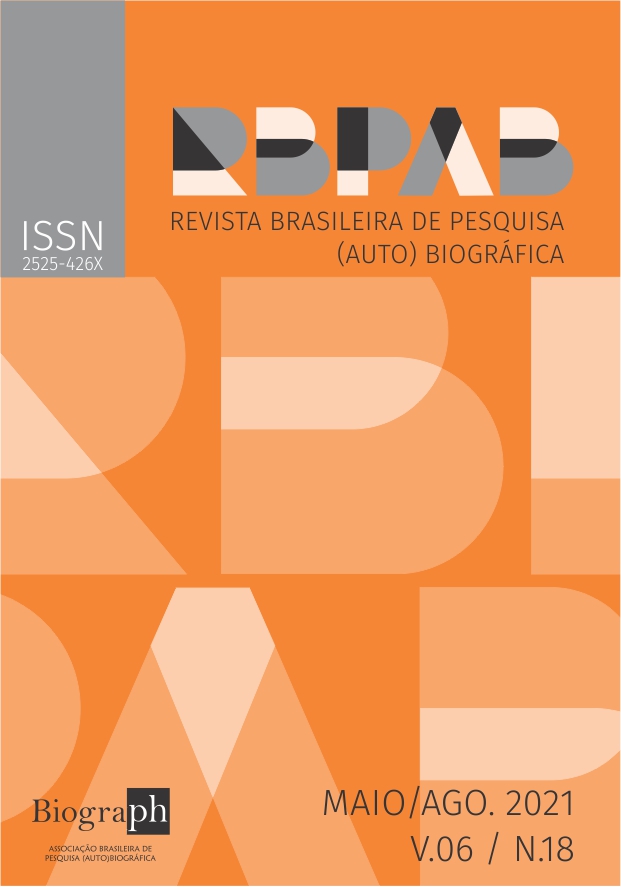Memórias de uma militante amazônida
DOI:
https://doi.org/10.31892/rbpab2525-426X.2021.v6.n18.p807-819Keywords:
Life history. Formation. MilitancyAbstract
Text intends to answer the following questions: How did I become a teacher? How did I become a militant in defense of the public school? How did I become a woman who fought and struggles to remain autonomous, free without losing femininity and the ability to be moved by the constant learning that life has given me? How did I become this woman who fights for a more egalitarian society? What is the place where I am? What paths did I take to get here? Why did I make certain choices? I narrate the trajectory showing how I became a teacher, woman and activist, showing that it is a reflective moment, based on the praxis that I developed in the teaching process. When establishing the connections in this trajectory, I highlighted the paths I followed and the reason for certain choices. I showed the contradictions, the relationships between the parties, the connection with the whole and the mediations made in the process of being a teacher / educator. As I always recorded the remarkable moments of my existence, the analysis was carried out based on these documents. What was convenience became a choice, I wanted to be a teacher, a political activist and a woman engaged in the struggle for freedom, both personally and collectively.
Downloads
References
ALVES, Alvaro Marcel. O método materialista histórico dialético: alguns apontamentos sobre a subjetividade. Revista de Psicologia da UNESP, v. 9, n. 1, p. 1-13, 2017.
ANTUNES, Ricardo. Adeus ao trabalho? São Paulo: Cortez, 1995.
BENJAMIN, Walter. O narrador: considerações sobre a obra de Nikolai Leskov. In: BENJAMIN, Walter. Magia e técnica, arte e política: ensaios sobre literatura e história da cultura. São Paulo: Brasiliense, 1994. p. 197-221.
DELGADO, Lucilia de Almeida Neves. História oral e narrativa: tempo, memória e identidades. História oral, v. 6, p. 9-25, 2003.
FREIRE, Paulo. A Pedagogia do Oprimido. Rio de Janeiro: Paz e Terra, 2013.
JELIN, Elizabeth. De qué hablamos cuando hablamos de memorias: los trabajos de la memoria, p. 1-17, 2001.
LANE, Sílvia. O homem em movimento. São Paulo: Cortez, 1989.
LENIN, Vladimir Llitch. Que Fazer? Problemas Candentes do Nosso Movimento. São Paulo: Arte Popular, 2010.
MALLMANN, Maria Izabel. Os ganhos da década perdida: democracia e diplomacia regional na América Latina. Edipucrs, 2008.
MARX, Karl. Manuscritos econômicos e Filosóficos. São Paulo: Boi tempo, 2004.
MOSCOVICI, Serge. A Representação Social da Psicanálise. São Paulo: Zahar, 1978.
MOURÃO DIEDERICHS, Arminda. O movimento de professores de 1º e 2º graus: uma análise crítica. Manaus: EDUA, 1998.
MOURÃO, Arminda Rachel Botelho; ALMEIDA, Carlos Augusto Gomes. O Espaço Público no Imperialismo do Século XXI. In: Heloisa da Silva Borges; Waldemar Moura Vilhena Júnior. (Org.). Educação do campo e as políticas sociais públicas. Boa Vista: Editora da Universidade Federal de Roraima, 2015, v. 1, p. 61-86.
NERUDA, Pablo. Confesso que vivi: Memórias. São Paulo: Difel, 1982.
PIRES, ELAINE. A escola no período dos exames de admissão ao ginásio: memórias do secundário. Anais... 30º Simpósio Nacional de História. Recife: ANPUH, 2019.
WILLIAN, Wagner. O soldado absoluto: uma biografia do Marechal Henrique Lott. 2ª edição. Rio de Janeiro: 2006.













































